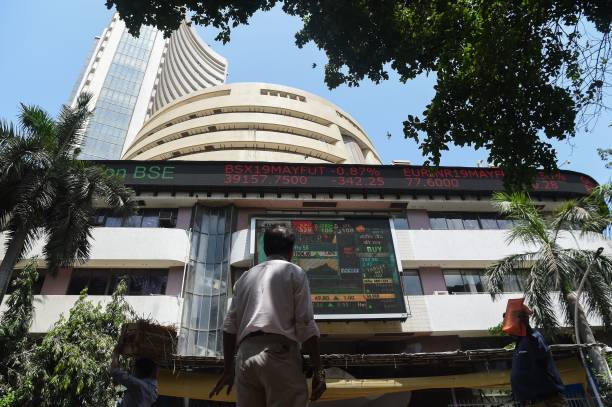25 Jan , 2022 By : Kanchan Joshi

MUMBAI : Nervous investors dumped their shares ahead of the US Federal Reserve’s monetary policy meeting and the Union budget next week even as they tracked the prospects of Russia invading Ukraine, sending stock prices reeling.
Indian benchmark indices Sensex and Nifty lost 3.5 percent each in intraday trading on Monday, their sharpest single-day decline since April last year. At close of trading, the BSE Sensex fell 1,545.67 points, or 2.62%, to 57,491.5. The Nifty shed 468.05 points, or 2.66%, to 17,149.10.
Stocks corrected sharply, possibly reacting to US equities trending lower and rising crude prices amid geopolitical tensions, said Amar Ambani, senior president and head-institutional equities, Yes Securities.
“There were no positive triggers to take the market upwards in the near term, which is why volumes in large-cap names are down 20-30% in 2022 so far from 2021, even when market caps are higher by 20-25% on a year-on-year basis. While a further 500 points downside cannot be ruled out in the Nifty, the stock market is much lighter and healthier, heading into the Union budget after the high in mid-October 2021. Corporate earnings have been positive so far, and Omicron didn’t disrupt the economy materially," he said.
Most Asia-Pacific markets were also under pressure. In South Korea, the Kospi fell 1.49%, while Hong Kong’s Hang Seng index slipped 1.24%.
Siddhartha Khemka, head of retail research at Motilal Oswal Financial Services Ltd, said Indian markets witnessed a sharp decline, in line with a broader sell-off in global equities amid concerns over the Fed’s coming meeting where it is expected to signal a rate hike and balance-sheet reduction for the year. “Rate-hike expectation, consistent foreign institutional investor selling, rising crude prices, geopolitical tensions between Russia and Ukraine, and mixed quarterly results so far have been the major reasons for the weakness in equity markets. Global cues and the coming Union budget would be the key factors driving the market direction in near term. On the political front, outcome of the assembly polls, which will be held between 10 February to 7 March in five states, would also be closely monitored," Khemka said.
On Monday, NATO said it was putting forces on standby and reinforcing eastern Europe with more ships and fighter jets, in what Russia denounced as an escalation of tensions over Ukraine. The move was a further signal that the West is bracing for Russia to attack its neighbour after massing an estimated 100,000 troops within reach of the Ukrainian border, although Russia denies any intention of invading, Reuters reported.
Indian markets have succumbed to selling pressure since 18 January, with both Sensex and Nifty shedding over 6% in a week. Relentless selling by foreign portfolio investors, who have drained $1.26 billion from Indian equities in January, has added to the pressure. However, domestic institutional investors are net buyers of Indian shares worth Rs7,430.35 crore so far in 2022, cushioning the decline to some extent.
With the massive sell-off, Indian equities seem to be fast approaching a correction phase, typically considered when markets decline 10% from the peak. At current levels, the Sensex and Nifty are down nearly 8% from their record highs in October. The BSE Midcap index is down 9% from its record high, while the BSE Smallcap has lost 6% since then.
The India volatility index, often referred to as the fear gauge, jumped 21% to 22.83 on Monday, indicating a rise in fear and anxiety among investors. India VIX is up 41% this year.
0 Comment